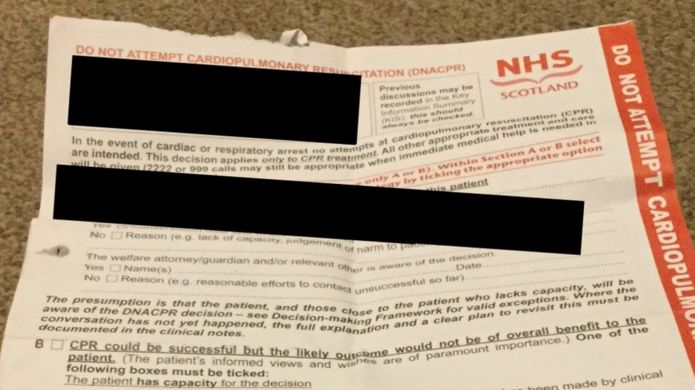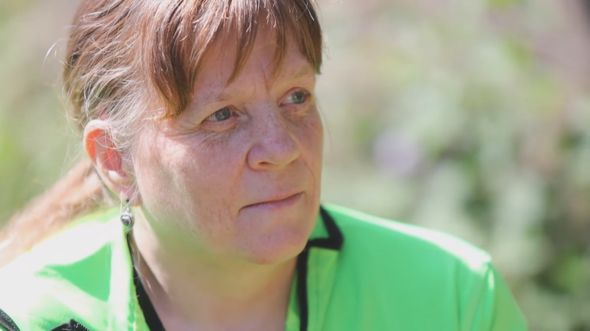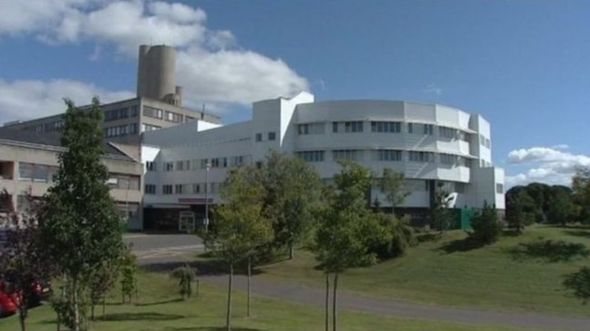Care Homes - Thrown Under The Bus
Sturgeon has no right accusing Johnson of caring less fo human life than she does. Have we forgotten those needless care home deaths already? https://t.co/hGYfWJRKV2 pic.twitter.com/FGE0ApyzDC
— Iain Macwhirter (@iainmacwhirter) July 21, 2021
Fair comment from Iain Macwhirter because it stands to reason that if there’s blood on Boris Johnson's hands - there’s blood on Nicola Sturgeon’s hands too!
Perhaps more so given the way Scotland's care homes were thrown under the bus!
Jeane Freeman - Human Lightning Rod (April 10, 2021)
Jeane Freeman is acting as a human lightning rod just days before she steps down as health minister.
But the buck stops with the first minister to explain why Scotland's care homes were 'thrown under the bus' over the discharge of untested hospital patients.
Care Homes - Thrown Under The Bus (20/05/20)

When the time comes to look back on the battle to stop the spread of Covid-19 I suspect the evidence will show that care homes across the UK were 'thrown under the bus'.
Some of the many challenges have already been widely reported in the media, often with the aim of finding someone to blame, but here are several issues which have jumped out to me so far.
- Hospitals have discharging patients into care homes without ensuring they are not infected with Covid-19
- Care home residents and staff in care homes have not been routinely tested for Covid-19 - despite repeated promises
- The supply of PPE (Personal Protection Equipment) to care homes has been slow and patchy
- The guidance on the use of PPE in care homes has been poor, for example on the wearing of face masks
- The absence of a robust TTI (Test, Trace, Isolate) policy has made it more difficult to contain outbreaks of Covid-19
- Patients who would normally be transferred to hospitals for treatment have been forced to remain in their care home
- Doctors have designated care home residents as DNR (Do Not Resuscitate) without consulting residents or their families
- Staff in the independent sector are being penalised for self-isolating because they do not receive their full pay
- The Care Inspectorate (which regulates the sector) has been accused of operating with too much of a 'light-touch' after suspending its inspections during the epidemic
Coronavirus, Care Homes and Testing (16/05/20)

The shocking deaths of 7 residents at the Home Farm care home in Skye has led to the Scottish Government taking the owners (HC-One) to court with a view to removing their licence.
Now I don't know the reasoning behind this decision, but you would imagine the Scottish Government must have a good case for taking such strong action.
But what is odd is that in West Dunbartonshire an even more shocking 16 residents died from Coronavirus after Crosslet House declared itself to be "Covid-19 free".
The Times reported this story on 22 April 2020 with the local MP (Jackie Baillie) and Scotland's health minister (Jeane Freeman) both condemning shameful behaviour which gave the impression that residents were being tested when they were not.
So what action, if any, was taken to safeguard residents at Crosslet House run by West Dunbartonshire council and why should this care home be treated any differently to the Home Farm facility in Portree?
CORONAVIRUS
Coronavirus in Scotland: testing at care homes increased after outcry
22 April 2020

Jeane Freeman, the Scottish health secretary, at Holyrood yesterday. She said that all new residents moving into homes would be tested for Covid-19 and isolated for 14 days - Photo
Inspections and coronavirus testing across Scotland’s care homes are being ramped up after ministers bowed to concerns about the number of residents falling ill.
Jeane Freeman, the Scottish health secretary, said that care homes “should not have seen the level of transmission” experienced if all the guidance on social distancing was being followed.
She announced a “considerable increase in intervention and oversight” with NHS public health directors told to report back on how nursing homes were coping, whether they were following the rules and had the necessary protective equipment.
In a significant change of policy, she also said all new residents moving into homes would be tested for Covid-19 and isolated for 14 days. Less than a week ago Nicola Sturgeon rejected calls to test potential care home residents, arguing that this could undermine other infection control measures.
Yesterday’s figures showed that the number of patients admitted to intensive care with the virus in Scotland was reducing. The death toll of confirmed cases was 985, up 70 from Monday.
Yesterday Jackie Baillie, the deputy leader of Scottish Labour, highlighted that Crosslet House care home, which is run by West Dunbartonshire council, had registered 16 deaths despite managers’ claims that it was “Covid-19 free”.
Ms Baillie accused the council of “a shameful piece of spin” and giving the impression that residents were being tested. Ms Freeman described the episode as “utterly shameful and completely unacceptable” and said the NHS’s regional director of public health would investigate.
The health secretary also promised that she would not leave the office last night until an issue was resolved of personal assistants who care for frail people in the community being unable to contact a helpline for supplies of personal protective equipment. Ms Freeman said: “There is no reason at this point why they cannot access PPE.”
Donald Macaskill, the chief executive of Scottish Care, which represents care home and home care providers, welcomed the new measures to support the sector. “This will support a very stretched sector to deal with the most vicious disease many of us have ever known in our lifetime,” he said.
During her statement in the chamber yesterday Ms Freeman made it clear that testing would be available for all care home staff and residents. She added: “We are also building the testing structure we need as we move to the next phase, our capacity to test, trace and isolate will be critical to controlling the virus.”
The Scottish Conservatives said they continued to hear of shortages of personal protective clothing. Jackson Carlaw, the party’s leader, said: “We keep hearing that Scotland has sufficient supplies of PPE for now and the foreseeable future. But still care homes, and carers working in communities, are being left exposed to the huge risks of coronavirus.
“There is clearly still a problem when it comes to getting these provisions to those who need them and we’re now several weeks into this crisis.”
Ms Freeman said there were enough supplies but that efforts were required to continue ensuring this was the case.
Scotland's Care Homes - Thrown Under The Bus? (29/12/20)
The Sunday Post has done more than most to expose the shabby treatment of Scotland's care homes during the Coronavirus epidemic.
And here's another excellent article which highlights a number of important issues including the use of DNR notices without the knowledge and consent of care home residents or their families.
Do Not Resuscitate - Doctors Playing God? (06/06/20)
A reader with personal experience of a DNR order being issued to a close family (without the patient or family's knowledge) has been in touch to say that she agrees the practice deserves to be thoroughly investigated.
So what do the country's politicians and key advisers have to say?
Do Not Resuscitate - Who Decides? (04/06/20)

The Scottish Government announced recently that the police would be investigating deaths in Scotland's care homes during the Coronavirus epidemic.
Now that's a good thing if you ask me, but who is investigating the practice of placing 'Do Not Resuscitate' or DNR orders on patients which is reported in the article below from the BBC?
The practice was also highlighted in the BBC Scotland Disclosure programme back in May 2020 which claimed that GPs were routinely issuing DNR orders without consulting patients (care home residents) or their families.
So why does the Scottish Government not widen the scope of Police Scotland investigations to include all DNR orders (which only doctors can issue) in all care and hospital settings - unless there is a properly signed consent form from the patient and/or the patient's family?
https://www.bbc.co.uk/news/uk-scotland-tayside-central-52861788
Family's shock after do not resuscitate form found in pensioner's bag

Sitting at the top of Catriona Black's 88-year-old mother's bag after her return from a 12-night stay in hospital was an NHS document - it was headed "Do Not Attempt Cardiopulmonary Resuscitation."
The form, known as a DNR, means health professionals will not use CPR to try to restart the heart and breathing of a patient.
The pensioner's family say she was "disorientated" and "confused", and question if she understood what the form meant.
NHS Tayside has apologised for how the document was found, and is reviewing the circumstances around the DNR.
BBC Scotland understands it has since been revoked.

Ms Black's mother went to Dundee's Ninewells Hospital on 7 May after she began to suffer hallucinations after a fall.
The family were not permitted to visit due to coronavirus, but two daughters spoke to their mum on the phone during her stay.
They said staff told them their mother was "confused".
Ms Black said she found the DNR "stuffed in a bag" when her mum was discharged.
She said: "I just got such a shock. It was just overwhelming to discover there was something as major as that and no-one had heard."
Her mother's discharge notes said she was suffering from "ongoing delirium".

Ms Black said: "I just don't think that was the time or the place (for a DNR) because I don't think she was fully lucid at any point.
"You don't ask somebody a question like that at a moment of weakness and say: 'Tick the box. That's her. She's a DNR'.
"And then never discuss that again with them."
She says the DNR form has been "preying" on her mother's mind, and that she has been "very distressed about it".
What is a DNR form?
A "Do Not Attempt Cardiopulmonary Resuscitation" (DNR) form is kept with a patient's health records. It is used when doctors decide that CPR will not work.
CPR can involve pushing down on someone's chest, using a mask or tube to help them breathe, or using electric shocks to restart the heart.
NHS Scotland guidance says there are scenarios where trying to restart your heart and breathing may do more harm than good, by not allowing you to die naturally.
Doctors make the final decision, but they should listen to a patient's opinion.
NHS guidance states: "You may wish to talk to your family, close friends or carers.
"They may be able to help you make a decision you are happy with."
If you cannot understand information given about a DNR, a "legal proxy" can represent your wishes.
Ms Black's sister has power of attorney for her mother, meaning she has the authority to deal with aspects of her welfare if she is incapacitated. She was never informed of the DNR.
Health Secretary Jeane Freeman told BBC Scotland that "difficult conversations" around DNRs "should always be handled with the utmost compassion, care and tact".
NHS Tayside said it would carry out "an immediate review" into the circumstances of the Do Not Resuscitate order.
A spokesperson for the health board said: "We have spoken with the family and apologised for any distress caused to them from finding the 'Do Not Resuscitate' form amongst her belongings.
"We are very sorry for the upset this has caused and we have offered to meet with the family so that they have the opportunity to discuss their concerns and ask any questions."


